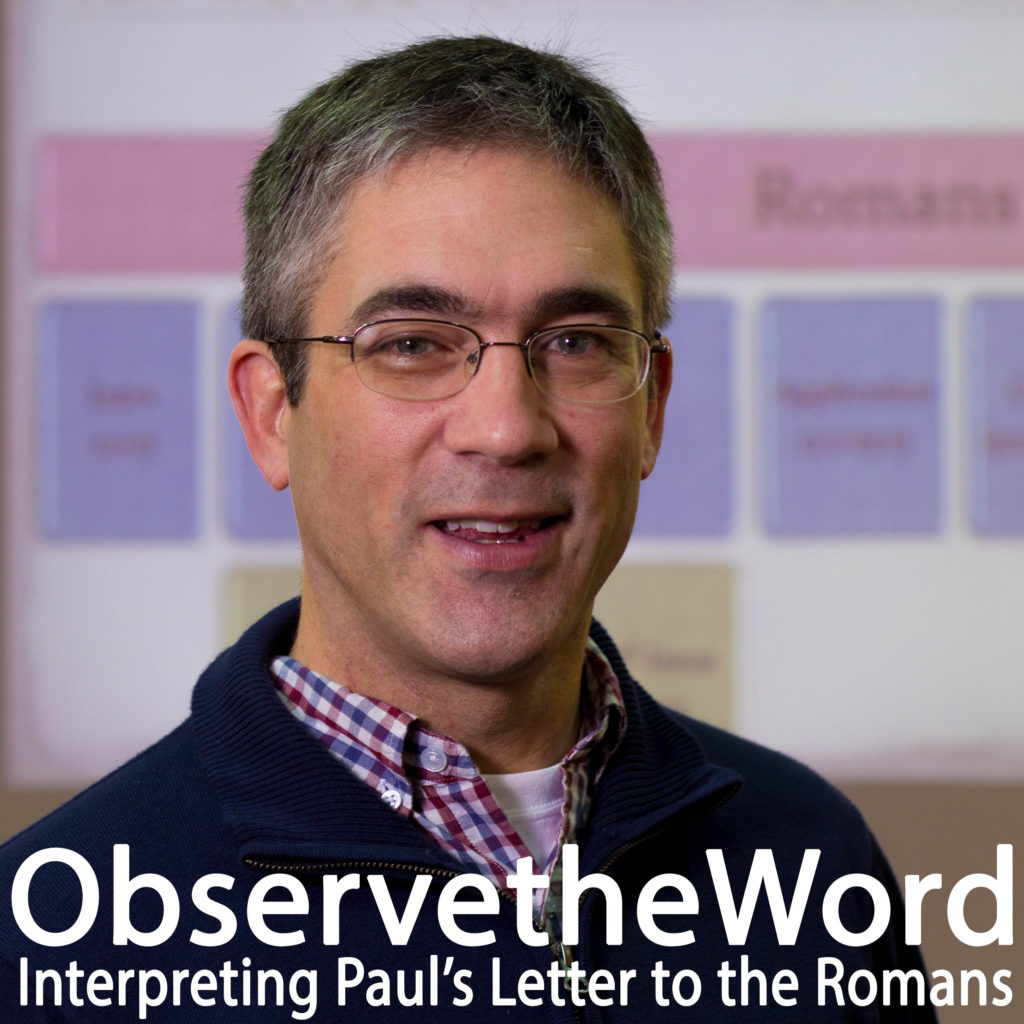Interpreting Paul’s Letter to the Romans

The biblical letter to the Romans provides an in-depth explanation of the Gospel of Jesus Christ by the Apostle Paul with the purpose of establishing the Roman believers in the truth, so that they might be transformed through the life giving power of Jesus. As Paul declares, “I am not ashamed of the gospel, for it is the power of God for salvation to everyone who believes (Romans 1:16)!” In this series, Bible teacher Michael Brent guides listeners through the structure and thought of Paul’s proclamation to the Romans with the goal that we too might be established and transformed.
| Introduction (Romans 1:1-17) |
| 1. Introduction: Greeting and Blessing |
In Romans 1:1-7 we encounter Paul’s self-description to a church he had never visited and learn more about the Roman believers. |
| 2. Introduction: Thanksgiving and Prayer |
In Romans 1:8-15, we consider how Paul uses the letter introduction to motivate the Romans to receive his gospel teaching. |
| 3. Introduction: Thesis Statement |
In Romans 1:16-17, we encounter the topic of Paul’s argument for the letter, regarding the power of the gospel to save. |
| Justified By Faith (Romans 1:18-5:21) |
| 4. Romans 1:18-32 Justified: Pagan man |
In Romans 1:18-32, Paul levels an indictment against pagan man – both ancient and modern. |
| 5. Romans 2:1-16 Justified: Moral man |
In Romans 2:1-16, Paul extends his charge to include people who feel safeguarded by a sense of their own morality. |
| 6. Romans 2:17-29 Justified: Religious Man |
In Romans 2:17-29, Paul further extends his charge against those who presume their religious activities make up for their moral failures. |
| 7. Romans 3:1-8 Justified: Two Objections |
In Romans 3:1-8, Paul raises two objections to his charge against religious people in the previous chapter. |
| 8. Romans 3:9-20 Justified: Closing Argument |
In Romans 3:9-20, Paul presents the closing argument of his indictment of all humanity. |
| 9. Romans 3:21-30 Justified: Surprise Verdict |
In Romans 3:21-30, finally, Paul the prosecutor gives us good news in a surprise verdict. |
| 10. Romans 3:31-4.8 Justified: Precedent, part 1 |
In Romans 3:31-4:8, Paul offers Abraham as a precedent for his gospel argument that people can only be declared righteous in God’s by grace through faith. |
| 11. Romans 4:9-25 Justified: Precedent, part 2 |
In Romans 4:9-25, Paul develops his assertion that the covenant of promise God made with Abraham serves as a precedent to the covenant of grace that came through Jesus Christ. |
| Empowered In Grace (Romans 5-8) |
| 12. Romans 5:1-11 Empowered: Secure Hope I |
In Romans 5:1-11, Paul moves into the second major stage of his teaching on the gospel of Jesus Christ, showing the power of the gospel by emphasizing the secure hope and deep joy that come from standing in grace. |
| 13. Romans 5:12-21 Empowered: Adam to Jesus |
In Romans 5:12-21, Paul describes the power of grace as a realm change; a transfer from the kingdom of the living dead to participation in the kingdom of life; a move from the kingdom of Adam – sin – death to the kingdom of Jesus – grace – life. |
| 14. Romans 6:1-14 Empowered: Strength of Grace I |
In Romans 6:1-14, Paul challenges the idea that grace encourages sin by assuming a new perspective and describing a new union as true realities in the lives of of those who have truly received the gift of grace. |
| 15. Romans 6:15-23 Empowered: Strength of Grace II |
In Romans 6:15-23, Paul continues to show the strength of grace to produce righteous living by providing the believer with a new heart, a new master, a new trajectory and a new process. |
| 16. Romans 7:1-6 Empowered: The New Way |
In Romans 7:1-6, Paul completes his defense for the strength of grace as he prepares to describe for us the weakness of law. |
| 17. Romans 7:7-12 Empowered: Weakness of Law I |
In Romans 7:7-12, Paul begins his argument that the law has a critical weakness in its attempts to produce righteous living in the lives of people. |
| 18. Romans 7:13-25 Empowered: Weakness of Law II |
In Romans 7:13-25 Paul masterfully describes the inner struggle of the conscious and particularly the weakness of his will to do the good he knows he should do. Is he speaking as a Christian or as a non-Christian? |
| 19. Romans 8:1-17 Empowered: Flesh and Spirit |
In Romans 8:1-17, Paul restates the gospel, including the role of the Holy Spirit, and contrasts our former state in the flesh with our new state in the Spirit. |
| 20. Romans 8:18-27 Empowered: Secure Hope IIa |
In Romans 8:18-27, Paul addresses both intellectual and emotive realities of suffering to help us understand that life in the Spirit does not mean life free from pain. |
| 21. Romans 8:28-39 Empowered: Secure Hope IIb |
In Romans 8:28-39, Paul concludes the second major section of Romans on the power of grace declaring for us again the secure hope we have in Jesus. |
| Included Through Mercy (Romans 9-11) |
| 22. Romans 9:1-5 Included: Lament |
In Romans 9:1-5, Paul introduces the third major section of his argument for the gospel of Jesus Christ with a prayer of lamnet for his kinsmen, the people of Israel. |
| 23. Romans 9:6-29 Included: Missed mercy |
In Romans 9:6-29, Paul begins his argument that though most Israelites are excluded from the New Covenant people of God, God remains faithful to his promises to Israel. |
| 24. Romans 9:30-10.11 Included: Missed faith 1 |
In Romans 9:30-10:11, Paul continues his explanation for the exculsion of most Israelites from the New Covenant people, providing a warning to all traditionally religous peoples, Christian or otherwise, tempted to exclude those who do not fit their system. |
| 25. Romans 10:12-21 Included: Missed faith 2 |
In Romans 10:12-21, Paul completes his argument that Israel has largely missed out on inclusion in the New Covenant people of God by stubborn refusal to accept God’s plan of salvation in the gospel of Jesus Christ. |
| 26. Romans 11:1-10 Included: Current remnant |
In Romans 11:1-10, Paul reassures that, though the majority of Israel is hardened against the gospel of Jesus, God remains faithful to true Israel, the remnant comprised of Jewish believers who continue to walk in faith accepting the grace of Jesus Christ. |
| 27. Romans 11:11-24 Included: Future revival 1 |
In Romans 11:11-24, Paul argues that while the current hardening of Israel against the gospel benefits the rest of the world, God has future plans for Israel. |
| 28. Romans 11:25-36 Included: Future revival 2 |
In Romans 11:25-36, Paul warns against any kind of ethnic or moral or spiritual prejudice as he affirms the impartiality of God and looks ahead to the future revival of Israel. |
| Worship as a Living Sacrifice (Romans 12:1-15:13) |
| 29. Romans 12:1-2 Worship: Response |
In Romans 12:1-2, moving from explanation of the gospel to application, Paul provides a model for Christian living: respond, present, renew. |
| 30. Romans 12:3-8 Worship: Body |
In Romans 12:3-8, Paul’s first scenario for applying grace is in regard to the new community of grace, where we challenges us to see ourselves with sound judgment as members of a body who have unique gifts to contribute. |
| 31. Romans 12:9-21 Worship: Love |
In Romans 12:9-21, Paul’s second scenario for applying grace focuses on the Christian ethic of love, in the body of Christ, in general relationship and with others in society. |
| 32. Romans 13:1-7 Worship: Government |
In Romans 13:1-7, Paul’s third scenario for living out the gospel of Jesus hits us where we live on all levels, while also raising significant, challenging questions about justice. |
| 33. Romans 13:8-14 Worship: Society |
In Romans 13:8-14, Paul’s fourth scenario addresses how to present yourself to God as you live out the gospel in society. |
| 34. Romans 14:1-12 Worship: Acceptance 1 |
In Romans 14:1-12, we start Paul’s fifth application scenario with two principles that enable us to accept one another in spite of disagreement over issues of conscience. |
| 35. Romans 14:13-23 Worship: Acceptance 2 |
In Romans 14:13-23, Paul rounds out three principles for accepting one another in the midst of disagreement over issues of conscience: the principle of the master, the principle of faith and the principle of the stumbling block. |
| 36. Romans 15:1-13 Worship: Acceptance 3 |
In Romans 15:1-13, Paul completes his exhortation to the Roman Christians to live out the gospel by accepting one another in Christ. |
| Conclusion (Romans 15:14-16:27) |
| 37. Romans 15:14-33 Conclusion: Mission |
In Romans 15:14-33, Paul begins the conclusion to the letter with a focus on his missional purpose, inviting the Romans to partner with him and giving us insight into his strategy as a pioneering missionary. |
| 38. Romans 16:1-24 Conclusion: Greetings |
In Romans 16:1-24, Paul’s final greetings to the Romans give us a glimpse into the makeup of the 1st century community of believers. |
| 39. Romans 16:25-27 Conclusion: Final words |
In Romans 16:25-27, Paul closes out his presentation of the gospel of Jesus Christ with a packed benediction in which he reminds us of the letter’s purpose, topic, antecedent, scope and goal. |
